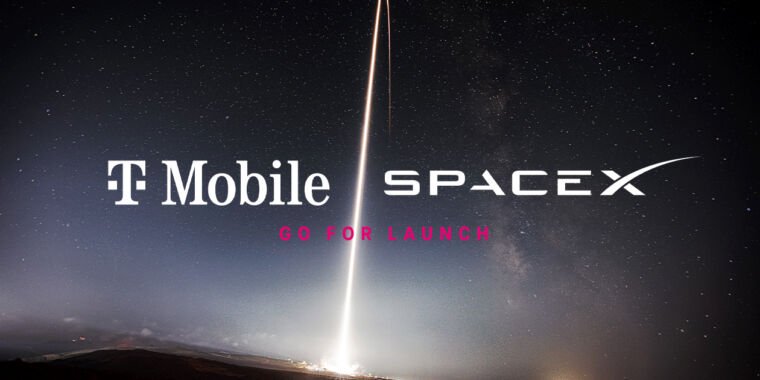T-Mobile
AT&T and Verizon are urging telecom regulators to reject a key part of SpaceX’s plan to offer cellular service with T-Mobile, claiming the satellite system will interfere with and degrade service for terrestrial mobile broadband networks.
Filings urging the Federal Communications Commission to deny SpaceX’s request for a waiver were submitted by AT&T and Verizon this week. The plan by SpaceX’s Starlink division also faces opposition from satellite companies EchoStar (which owns Dish and Hughes) and Omnispace.
SpaceX and T-Mobile plan to offer Supplemental Coverage from Space (SCS) for T-Mobile’s cellular network using SpaceX satellites. As part of that plan, SpaceX is seeking a waiver of FCC rules regarding out-of-band emission limits.
AT&T’s petition to deny the SpaceX waiver request said the FCC’s “recent SCS order appropriately recognized that SCS deployments should not present any risk to the vital terrestrial mobile broadband networks upon which millions of Americans rely today. The Commission authorized SCS as secondary to terrestrial mobile service, correctly explaining that the SCS framework must ‘retain service quality of terrestrial networks, protect spectrum usage rights, and minimize the risk of harmful interference.'”
AT&T said SpaceX’s requested “ninefold increase” to the allowable power flux-density limits for out-of-band emissions “would cause unacceptable harmful interference to incumbent terrestrial mobile operations. Specifically, AT&T’s technical analysis shows that SpaceX’s proposal would cause an 18% average reduction in network downlink throughput in an operational and representative AT&T PCS C Block market deployment.”
Verizon predicts phone problems
Verizon’s opposition to the waiver request similarly said that SpaceX’s proposal “would subject incumbent, primary terrestrial licensee operations in adjacent bands to harmful interference.” Wireless phone performance will suffer, Verizon said:
Assuming a handset antenna gain of -3 dBi, SpaceX’s proposal still results in an interference to noise (I/N) ratio of -3 dB—well above the ITU [International Telecommunication Union] threshold SpaceX claims would protect terrestrial devices. SpaceX’s proposed margin therefore fails to adequately protect terrestrial user equipment from potential interference from SCS satellite systems, including user equipment that may not fall within the flagship performance parameters, and should be rejected.”
SpaceX likewise provides no reasonable justification for why a service intended to supplement primary terrestrial services should be allowed to cause harmful interference in contravention of the Commission’s rules and policies.
AT&T and Verizon both intend to offer Supplemental Coverage from Space as part of separate deals with AST SpaceMobile. AT&T was running ads indicating that it already offered such coverage even though it isn’t available yet, and grudgingly agreed to change the ads after a complaint from T-Mobile.
SpaceX and other entities interested in the proceeding have until August 22 to submit responses in the FCC docket. The deadline for replies to responses is August 29.
We contacted SpaceX today and will update this article if it provides a response. While the company hasn’t yet responded to the AT&T and Verizon filings, it looks like SpaceX will put forward a spirited defense.
SpaceX: Rivals will “make misleading claims”
SpaceX and T-Mobile representatives met with FCC staff on August 8, SpaceX said in a filing that describes the meeting. SpaceX and T-Mobile told FCC staff that their plan will not harm other wireless operations and predicted that competitors will make misleading claims:
With their commercial launch fast approaching, the parties also expressed an expectation that competitors would continue to make misleading claims and draconian demands to further delay Commission action and limit service to American consumers. Indeed, each time that SpaceX has demonstrated that it would not cause harmful interference to other operators—often based on those parties’ own claimed assumptions—those competitors have moved the goalposts or have claimed their analysis should not have been trusted in the first place. These operators’ shapeshifting arguments and demands should be seen for what they are: last-minute attempts to block a more advanced supplemental coverage partnership and siphon sensitive information to aid their own competing efforts. The Commission must not allow competitive gamesmanship to stand in the way of lifesaving service for American consumers.
In addition to requesting a waiver, SpaceX’s filing argued that the FCC’s emissions limit is too strict and should be changed. The FCC should “reconsider its inappropriately uniform out-of-band emissions PFD limit of -120 dBW/m2/MHz, which is an order of magnitude more restrictive than necessary to protect terrestrial operations adjacent to the PCS G Block,” SpaceX wrote. “The limit does not take into account the role of frequency in determining appropriate PFD limits to meet the internationally accepted -6 dB interference-to-noise (‘I/N’) threshold.”
T-Mobile told the FCC in last week’s meeting that “it has both the strong incentive and the obligation to ensure that out-of-band emissions do not cause harmful interference” because it has licenses in both the PCS G Block and adjacent PCS C Block. “Based on its review of SpaceX’s waiver request and petition for reconsideration, T-Mobile reiterated its confidence that the proposed operations in the PCS G Block would not cause harmful interference to adjacent-band terrestrial operations, including T-Mobile’s own adjacent-band operations,” the filing said.
SpaceX said it has launched over 100 satellites with direct-to-cellular capabilities so far, and that both it and T-Mobile “have made significant progress testing the early network, demonstrating the robust capabilities of the system.”
Source link
